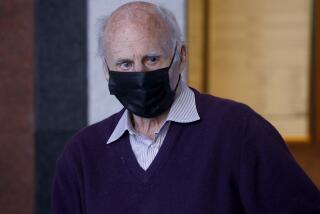Death row inmate should be reevaluated or get new trial, court says
A death row inmate who represented himself during a 1994 hearing to determine whether he was mentally competent to stand trial should either be reevaluated or receive a new trial, the California Supreme Court decided unanimously Monday.
Justice Kathryn Mickle Werdegar, writing for the court, said state law clearly requires defendants to have legal representation during hearings to determine whether they are sane enough to be tried. Legal representation during competency hearings “is consistent with upholding the dignity and autonomy of the defendant and, more importantly, protects not only the fairness of the proceedings but also the appearance of fairness,” Werdegar wrote.
The ruling came in an appeal of the 1995 conviction of Christopher Charles Lightsey, who was sentenced to death for burglarizing, robbing and murdering William Compton, 76, two years earlier at Compton’s Bakersfield home.
During the legal proceedings, Lightsey was disruptive and antagonistic; he refused to cooperate with his lawyers and fired five of them, the court said. His attorneys said at the time that they believed Lightsey was delusional and incapable of assisting in his own defense.
During a competency hearing, Lightsey insisted on representing himself. He had an advisory lawyer on standby should Lightsey have questions, but that attorney had no opportunity to participate, the court said. A psychiatrist chosen by the court found Lightsey was too ill to be tried, while another selected by the prosecution found he was competent. The judge agreed with the prosecution.
Monday’s ruling returns the case to Kern County Superior Court, where a judge will have to evaluate 18-year-old evidence to determine whether Lightsey was fit to be tried. If such a reevaluation proves impossible or determines Lightsey was incompetent, a new murder trial should be held, the court said.
It was unclear why Lightsey’s appeal took 18 years. The court docket showed that Lightsey’s attorneys changed over the years, and his current lawyers requested extensions to prepare their briefs. Their final brief was filed with the court in March 2009.
Manuel J. Baglanis, one of Lightsey’s lawyers, and Deputy Atty. Gen. Kari Ricci, who represented the prosecution, declined to comment. Erik N. Larson, Lightsey’s lead attorney, could not be reached for comment.
More to Read
Sign up for Essential California
The most important California stories and recommendations in your inbox every morning.
You may occasionally receive promotional content from the Los Angeles Times.











